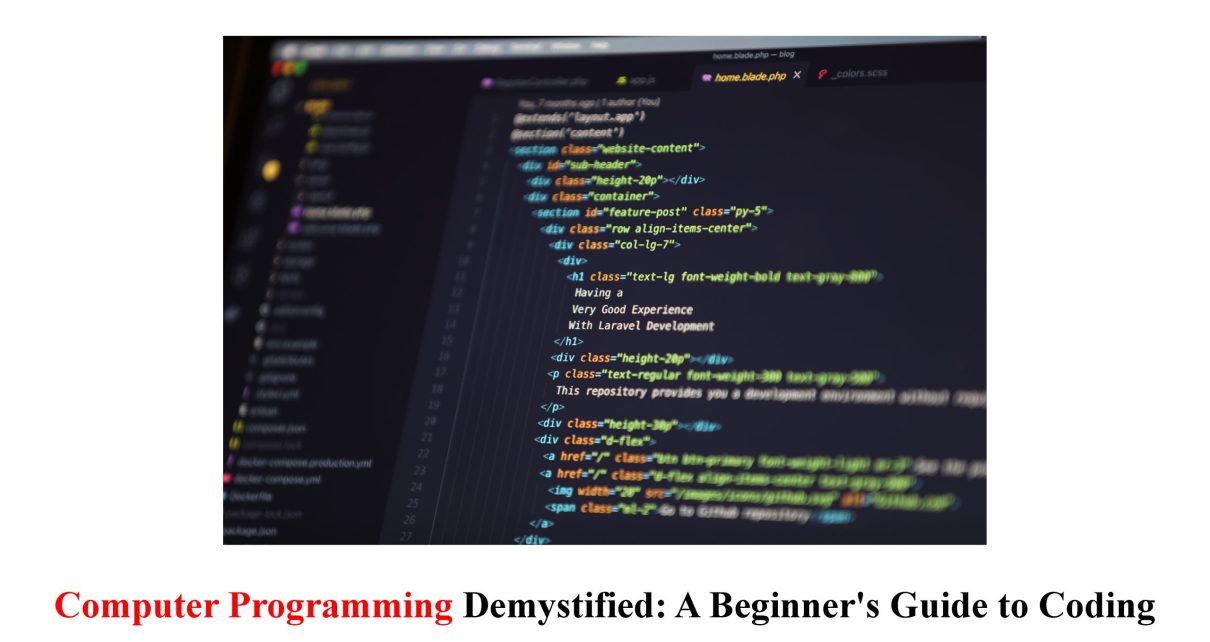Welcome to the fascinating world of computer programming! Have you ever wondered how websites are built, apps are created, or video games come to life? The answer lies in the realm of coding. Computer programming is a skill that empowers you to communicate with computers and instruct them on what to do. It’s like learning a new language, but instead of conversing with people, you’re conversing with machines.
In this beginner’s guide, we’ll demystify the art of coding and provide you with all the essential knowledge and tools needed to kickstart your programming journey. Whether you plan to pursue a career in software development or simply want to understand how technology works under the hood, learning computer programming will open up endless possibilities for growth and innovation.
So buckle up as we delve into this exciting realm where lines of code transform into powerful applications that shape our digital world! Let’s begin by understanding why learning computer programming is worth your time and effort.
What is Computer Programming?
Computer programming is the art of writing instructions for computers to follow. It involves creating a set of logical and organized commands that enable a computer to perform specific tasks or solve problems. These commands are written using programming languages, which act as the intermediary between human language and machine language.
In essence, programmers use their creativity and problem-solving skills to design software programs that can accomplish various goals. Whether it’s developing mobile apps, designing websites, or building complex algorithms, computer programming forms the backbone of modern technology.
Programming languages come in different types and variations, each with its own syntax and purpose. From popular languages like Python and Java to specialized ones like HTML and CSS for web development, there is a vast array of tools at your disposal. The choice of programming language depends on what you want to achieve and the level of complexity required for your project.
As you dive into the world of coding, you will encounter concepts such as variables, loops, conditionals, functions – all these elements work together harmoniously to bring your code alive. Learning how these pieces fit together will allow you to build robust applications from scratch or modify existing ones according to your needs.
Computer programming provides an avenue for problem-solving on both small scales (like automating repetitive tasks) and large scales (such as analyzing massive datasets). By understanding how computers think and operate through code execution step by step, you gain control over machines’ behavior while unlocking limitless possibilities in innovation.
So now that we have demystified what computer programming entails let’s explore why learning this skill is incredibly valuable!
Why Learn Programming?
In today’s digital age, learning programming is becoming increasingly important. Whether you are a student wanting to enhance your skill set or a professional looking for better career prospects, coding can open up countless opportunities for you. Here are some compelling reasons why learning programming is worth your time and effort.
1. Job Opportunities: With the demand for skilled programmers on the rise, learning how to code can significantly boost your employability. From web development to artificial intelligence, there are numerous fields where programmers are in high demand.
2. Problem Solving Skills: Coding teaches you how to break down complex problems into smaller, more manageable parts. This analytical thinking and problem-solving approach can benefit you not only in programming but also in various other areas of life.
3. Creativity and Innovation: Programming allows you to bring your creative ideas to life by building applications, websites, games, and more. It gives you the power to create something from scratch and make a positive impact on the world around you.
4. Flexibility and Independence: Being proficient in programming offers flexibility as it enables remote work opportunities and freelancing gigs. You have the freedom to choose when and where you want to work while enjoying a potentially higher income potential.
5. Learning How Technology Works: In our tech-driven society, understanding how technology works has become crucial even if coding isn’t directly related to your field of interest.
Expanding your knowledge about computer systems will give an edge over others as technological literacy becomes increasingly important with each passing day
As we move forward into an increasingly digital future, programming skills will become essential across industries.
It’s never too late or too early start exploring this limitless world of possibilities that computer programming has waiting for us! So why wait? Start learning now!
Types of Programming Languages
When it comes to computer programming, understanding the different types of programming languages is essential. Each language has its own unique syntax and purpose, catering to specific needs and requirements. Here are some popular types of programming languages:
1. Object-Oriented Programming (OOP): OOP focuses on creating objects that contain both data and functions. This approach allows for modular and reusable code, making it easier to manage complex programs.
2. Procedural Programming: In procedural programming, a program is divided into smaller procedures or functions that perform specific tasks in a sequence. It follows a linear execution flow, making it suitable for simple applications.
3. Functional Programming: Functional programming treats computation as mathematical evaluation rather than changing state or data mutation. It emphasizes immutability and pure functions.
4. Scripting Languages: Scripting languages like JavaScript and Python are often used for web development or automation tasks due to their ease of use and flexibility.
5. High-level Language vs Low-level Language: High-level languages like Java or C++ provide abstraction from hardware details for easier coding while low-level languages like Assembly offer more control over hardware resources but require deeper technical knowledge.
Understanding these different types of programming languages can help you choose the right one based on your project’s requirements and your personal preferences as a programmer.
Getting Started: Essential Tools for Coding
When diving into the world of computer programming, it’s crucial to have the right tools at your disposal. These essential tools will not only make your coding journey smoother but also help you develop a strong foundation in programming.
First and foremost, you’ll need a reliable text editor or an integrated development environment (IDE). Popular options include Sublime Text, Visual Studio Code, and PyCharm. These tools provide features like syntax highlighting, auto-completion, and debugging capabilities that can significantly enhance your coding experience.
Next up is a web browser. While it may seem unrelated to programming at first glance, having a modern web browser is essential for testing and debugging web-based applications. Chrome Developer Tools and Firefox Developer Edition are particularly useful as they offer powerful inspection and profiling tools.
Version control systems such as Git are indispensable when collaborating with other developers or managing multiple versions of your codebase. Learning how to use Git effectively will not only help you track changes but also facilitate seamless collaboration within teams.
In addition to these foundational tools, learning a specific programming language requires installing its corresponding software development kit (SDK) or runtime environment. For example, if you’re interested in Java development, downloading the Java Development Kit (JDK) is necessary.
Don’t forget about online resources! Websites like Stack Overflow and GitHub can be valuable sources of knowledge and inspiration throughout your coding journey. Online tutorials and courses on platforms like Udemy or Coursera can also provide structured learning opportunities tailored to beginners.
Learning the Basics: Syntax and Logic
When you embark on your journey to learn computer programming, one of the fundamental concepts you’ll encounter is syntax. Simply put, syntax refers to the set of rules that govern how code is written in a particular programming language. Each language has its own unique syntax, which may seem overwhelming at first. But don’t worry! With practice and patience, it will become second nature.
Understanding logic is also crucial when it comes to coding. Logic allows you to solve problems by breaking them down into smaller steps that a computer can understand and execute. It involves using conditional statements (if-else) and loops (for, while) to control the flow of your program.
As a beginner, it’s important to grasp the basic syntax elements such as variables, data types, operators, and control structures like if statements and loops. These building blocks form the foundation of any program you create.
To enhance your learning experience in this area, there are countless online resources available including tutorials, video courses, interactive coding challenges, and forums where you can ask questions and receive assistance from experienced programmers.
Remember that practice makes perfect when it comes to mastering syntax and logic in programming. Start small with simple programs or exercises before gradually tackling more complex projects. Don’t be discouraged by mistakes; they are part of the learning process!
So roll up your sleeves and dive into learning about syntax and logic – two essential components for becoming proficient in computer programming!
Common Challenges for Beginners
Learning computer programming can be an exciting journey, but it’s not without its challenges. As a beginner, you may find yourself facing certain obstacles along the way. Understanding these common challenges can help prepare you and keep you motivated as you dive into the world of coding.
One of the most prevalent hurdles is grasping complex syntax and logic. Programming languages have their own set of rules and structures that must be followed precisely. It can initially feel overwhelming trying to understand how everything fits together, but with practice and patience, it will become more intuitive.
Another challenge beginners often face is troubleshooting errors in their code. Debugging is an essential skill for programmers, as even small mistakes can cause programs to fail or produce unintended results. Learning to read error messages effectively and systematically identifying issues will save you countless hours of frustration.
Imposter syndrome is another challenge that many beginners experience. It’s a feeling of inadequacy or self-doubt that stems from comparing oneself to more experienced programmers. Remember that everyone starts somewhere, and progress takes time. Embrace your journey and focus on your own growth rather than comparing yourself to others.
Lack of motivation or burnout can also hinder progress for beginners in programming. The learning curve may seem steep at times, causing frustration or fatigue. Setting realistic goals, taking breaks when needed, and finding ways to stay inspired can help combat these feelings.
Seeking out resources for further development can be challenging for beginners who are unsure where to look or what direction to take next. With numerous online tutorials, forums, coding communities, and books available today – finding reliable sources tailored towards your interests becomes easier over time!
Remember that every obstacle presents an opportunity for growth! By embracing these challenges head-on and persevering through them with determination – success in computer programming awaits! Keep pushing forward; soon enough you’ll see how far you’ve come!
Tips for Successful Learning
1. Set Clear Goals: Before diving into learning computer programming, it’s important to set clear goals for yourself. Are you interested in web development? Game design? Data analysis? Having a specific goal will keep you motivated and focused as you progress.
2. Start with the Basics: Just like building a house, programming requires a strong foundation. Start by learning the basics of a programming language such as variables, loops, and conditionals. Understanding these fundamental concepts will make it easier to grasp more complex topics later on.
3. Practice Regularly: Consistency is key when learning any new skill, including coding. Make it a habit to practice coding exercises or work on small projects regularly. This will help reinforce what you’ve learned and improve your problem-solving skills.
4. Embrace Challenges: Don’t be afraid to tackle challenging problems or projects! It’s through overcoming difficult tasks that we grow the most as programmers. Push yourself out of your comfort zone and embrace the opportunity to learn from your mistakes.
5. Utilize Online Resources: The internet is filled with valuable resources for learning computer programming. Take advantage of online tutorials, forums, coding bootcamps, and communities where you can ask questions and get feedback from experienced programmers.
6. Collaborate with Others: Programming doesn’t have to be a solitary pursuit! Collaborating with other learners or joining coding meetups can expose you to different perspectives and teach you new techniques or approaches.
7. Seek Continuous Learning Opportunities : Computer programming is an ever-evolving field; there are always new technologies and languages emerging.
To stay up-to-date on industry trends,follow relevant blogs,podcasts,and attend workshops or conferences whenever possible.
It’s important to remain curious and never stop learning!
By following these tips for successful learning in computer programming,you’ll be well-equipped to take on any coding challenge that comes your way.
Remember,it may seem overwhelming at first,but with dedication and perseverance,you can become a proficient programmer! So,keep
Resources for Further Development
Once you’ve grasped the basics of computer programming, it’s essential to continue learning and expanding your skills. Luckily, there are numerous resources available that can help you take your coding abilities to the next level.
Online tutorials and courses are a great way to deepen your understanding of programming concepts. Websites like Codecademy, Coursera, and Udemy offer a wide range of courses in various programming languages. These platforms often provide interactive exercises and projects that allow you to practice what you’ve learned.
Another valuable resource is online coding communities and forums. Websites like Stack Overflow and GitHub have vibrant communities where programmers from around the world share their knowledge, ask questions, and collaborate on projects. Participating in these communities not only helps expand your knowledge but also allows you to connect with other passionate coders.
Books remain an excellent source of information for those seeking more in-depth knowledge about specific programming languages or concepts. Whether it’s a beginner-friendly guide or an advanced textbook, there is a vast library of books available on topics ranging from Python to algorithms.
Attending coding bootcamps or workshops can also be beneficial for further development. These intensive programs offer hands-on training led by experienced instructors who can guide you through complex coding challenges while providing real-world examples.
Don’t underestimate the power of practice! Building small projects or contributing to open-source software can greatly enhance your skills as a programmer. By applying what you’ve learned in practical scenarios, you’ll gain confidence and improve problem-solving abilities.
Remember that everyone learns differently; therefore, explore different resources until finding ones that resonate with your learning style best! The key is consistency – set aside regular time for studying new concepts and practicing code!
In conclusion… No wait! We’re not concluding just yet! There are countless avenues for further development when it comes to computer programming – so keep exploring new resources, staying curious about new technologies emerging every day!
Conclusion
In this beginner’s guide to coding, we have demystified the world of computer programming. We have explored what computer programming is and why learning it is so valuable in today’s digital age. We have also discussed the different types of programming languages and provided essential tools for getting started with coding.
Learning the basics of syntax and logic can be challenging for beginners, but with patience and practice, anyone can become proficient in coding. By facing common challenges head-on and seeking out resources for further development, aspiring programmers can overcome obstacles and continue to grow their skills.
Remember, successful learning requires dedication and a growth mindset. Embrace mistakes as opportunities to learn, stay motivated by setting clear goals, and seek support from online communities or mentors when needed. With determination and perseverance, you’ll be well on your way to becoming a skilled programmer.
If you’re ready to dive into the world of computer programming or want to expand your existing knowledge, there are plenty of resources available online that offer tutorials, courses, forums, and coding challenges. Take advantage of these resources to enhance your skills at your own pace.
Computer programming opens up countless possibilities for innovation and problem-solving. Whether you dream of developing cutting-edge software applications or simply want to understand how technology works behind the scenes – learning how to code is an invaluable skill that will empower you in many aspects of life.
So don’t let fear or intimidation hold you back! Start exploring the exciting world of computer programming today!
Remember: The only limit is your imagination! Happy coding!



